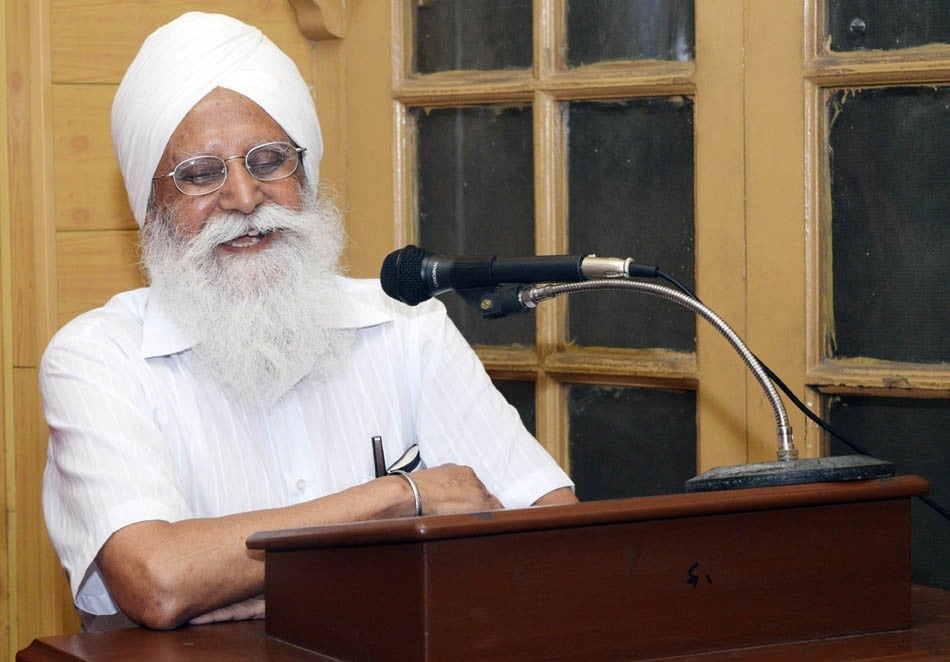
Canadian-based Punjabi poet and essayist Navtej Bharati was recently in town -- "on Lahore yatra," as he put it

Navtej Bharati, a Canadian-based Punjabi poet and essayist, was recently in town -- "on Lahore yatra," as he put it -- when the scribe met with him.
During his yatra, Bharati went to different educational institutions of the city where he delivered lectures to awe-struck audiences comprising literature students and senior professors. Thanks to his oratory skills and his magical verses.
He also visited Punjabi Adabi Sangat, Punjabi Department of the Punjab University (PU), Punjabi Majlis, Government College University (GCU), and attended numerous private gatherings.
Though he is approaching 8o, Bharati was full of energy and went about town like a young man would.
Born in 1938, in a small village of Indian Punjab -- Rode, tehsil Moga, which was once part of Ferozepur -- Navtej Bharati was initiated as a Giani but soon he joined regular school along with his younger brother Ajmer Rode who is also a known poet.
Recalling his early days, Bharati said, "The Giani of my village adopted me as I was sharp and intelligent. My [Giani] teacher was blind; I became his eyes for a good four years."
He had his early schooling in his village and went on to complete his FA from Ludhiana and Masters (in Punjabi) from Mahindra College, Patiala.
Bharati was eager to study under the tutorship of Professor Pritam Singh. His wish was granted, and he remained Singh’s student for a few years. (According to Najm Hosin Syed, Prof Pritam was the most authentic scholar of Punjabi Language and literature, and his last book on Baba Farid, the first Punjabi poet, is unmatched.)
Bharati left for Canada to pursue higher studies, in 1968, the year his first book ‘Simbal De Phul’ came out. He got a Masters’ degree in Philosophy from Victoria. He studied the Philosophy of Science for many years but could not complete his PhD. He now lives in London, Ontario with his wife Surinder Kaur Chahal, who is also a poet.
Not a very prolific writer, Bharti has authored four books till date, though he said he had been writing poetry since his school days. It was his second collection of poetry, titled ‘Leela’ (1999), co-authored by Ajmer Rode, which established him as a poet. A 1053-pager, ‘Leela’ is considered a rare book on modern Punjabi poetry.
His third book of poetry, ‘Lali’, came out in 2012. The book is based on a real character named Lali who, although illiterate, was well versed in oral tradition of poetry. The book is based on his life and sayings but it remains a creation of Bharati’s mind essentially.
It was his last book, ‘Othon Teek,’ where he broke his own diction and wrote verses about the small things in life. (Check out the titles of some of his poems -- ‘Aloo waley Parathay,’ ‘Mutter Kadi,’ and Aaj Apan TV Vaykhan Ge.’)
In his lecture at the Punjab University, Lahore, Bharati shared his fascination for learning and writing alphabets of Urdu and Gurmuki. "I thought I could never write ‘alif’ the way my teacher Lala Heem Raj would do," he said, on the occasion.
"There was magic in his hands as he scribbled on paper. His pen moved as if it was dancing."
He was in his fifth grade when he got in touch with Preet Larhi, founded by Gurbaksh Singh, who had influenced many generations in the pre-partition Punjab and later as well, with his revolutionary ideas and is, perhaps, the most revered writer in 20th century Punjabi literature.
Navtej Bharati also spoke about what being a poet entailed, and the role of poet. "A poet is a ‘rishi‘ (the seer). Normally, we have two physical eyes but ideology adds a third one. The intellectual (vaidvan) has seven eyes but the poet has several.
"Psychology discusses the mind of man, Economics the principals of market, and so on. The poet speaks of the total human being. Sometimes, ideology makes us blind and shows us what it wants us to see. So, a lot is left unseen."
Though being part of the left movement in youth, Bharati was never a party card holder. Criticising the leftists who lay too much emphasis on international politics, he said, "We’re ignoring our own, indigenous realities."
Recalling his memories of the partition of Punjab, Bharati became very emotional and poetic. "I still can’t forget the sound of the shutting of door forcibly while I was sitting at a place in my village. The lady of the house came running to me, shouting, ‘Oud has come, Oud has come,’ referring perhaps to the Muslims. The shutting of door struck so hard in my mind that it is still there."
However, he admitted that he had not been able to capture that moment in a poem.
Bharati’s candid confessions of his failures unveiled the lovable side of him.
His initial works are philosophical in nature but Navtej Bharati ended as being ‘anti-philosophy’ and even anti-poetry. His poetry was now more of a celebration of the most ordinary; a celebration of mere existence. For him to be just alive is most beautiful.
When he went back to Canada, he emailed me saying, "Lahore has become a part of me."
"Likewise," I said.